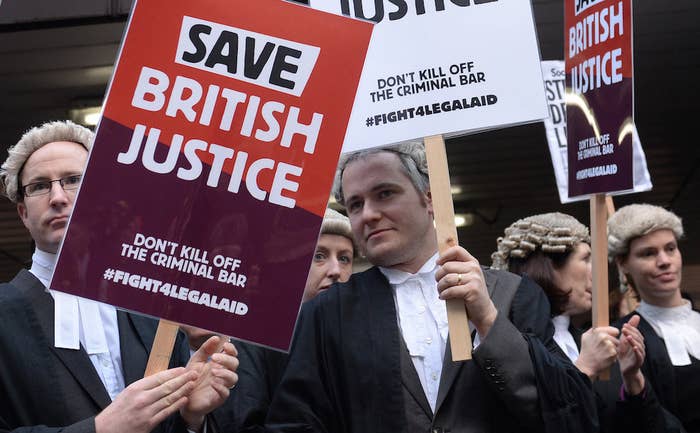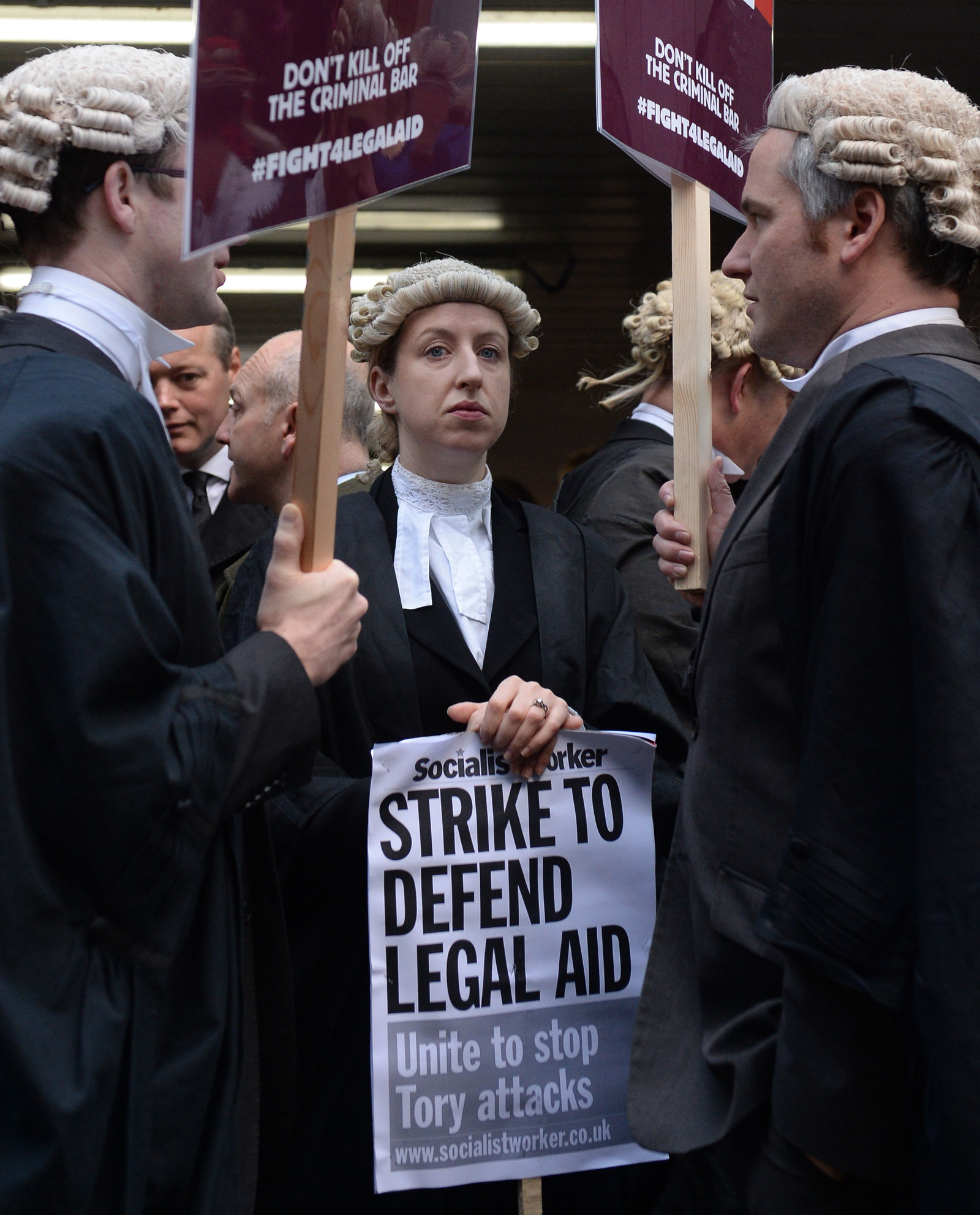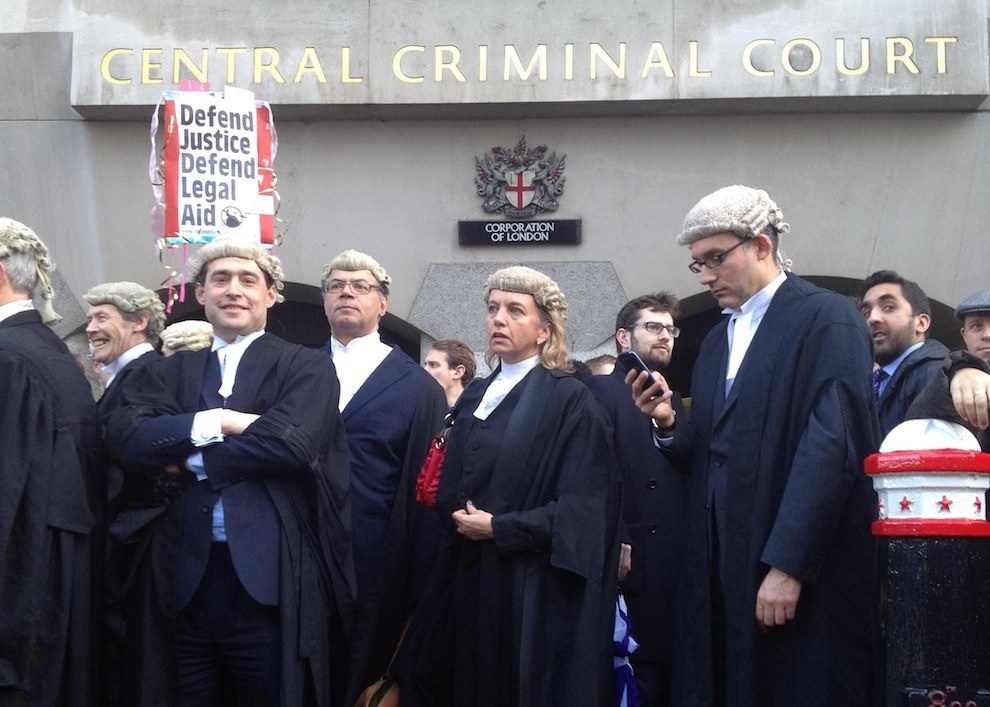
Criminal lawyers across England and Wales today began a mass walk-out in protest at sustained financial cuts to the justice system, including substantial reductions to legal aid funding.
Though based on a series of longstanding grievances, the immediate trigger for the action was the introduction of new legal aid fees for criminal barristers which comes into force on Sunday and which protestors say will mean a further cut to their income.
The protest is also against the wider impact of legal aid cuts on the public, which leave many vulnerable people unable to afford a lawyer in court. Over the last six months, BuzzFeed News has uncovered extensive evidence of the damage done to Britain’s justice system by decades of cuts to legal aid.
Reporting from courts across the country, BuzzFeed News has found countless examples of vulnerable people left to fend for themselves in court because they cannot afford a lawyer. These include a man facing drugs charges; a teenager who speaks no English fighting an asylum case and a grandmother fighting to prevent her grandchild growing up in care.
The action is being called by the Criminal Bar Association (CBA), 90% of whose members voted in favour of the action. Solicitors will too take part in mass walkouts while some court staff are also expected to strike in solidarity.
@JoshuaRozenberg @BarristerSecret Recently I received £47 an hour doing over 200 hours work preparing for a complex cybercrime trial in which the defendant eventually pleaded the week before. I see about half of that & then I am taxed. Under the new scheme the fee for all of that work is £705.
Some individual chambers had already decided to down tools. Barristers cannot technically strike as they are self-employed – but the effect will be much the same as courts grind to a halt this week.
The CBA has asked members to not take on any new legal aid cases from Crown Court from 1 April when the new fees come into force, meaning cases could be delayed from Tuesday onwards after the bank holiday.

Announcing the walk-out on Thursday, Angela Rafferty QC, chair of the Criminal Bar Association (CBA), said: “Lack of funding in the criminal justice system has resulted in near-collapse. The public accounts committee in 2016 said the criminal justice system was at breaking point. In my view it is now broken. We have to fix it.”
The new barristers’ fees, termed the Advocates' Graduated Fee Scheme (AGFS), will link pay for legal aid work to the complexity of a case.
The CBA said that barristers' fees have been cut by 40% over 20 years, with poor investment undermining progress made on diversity and social mobility in the profession.
Oliver Carter, co-chair of Young Legal Aid Lawyers, said that fixed fees for most criminal cases made it particularly tough for newly qualified barristers to make ends meet.
“For barristers the fixed fee for the hearing often isn’t sufficient for them to properly prepare a case,” he said.
“That’s the difficulty that a lot of junior barristers face – as well as more senior ones. A lot of their work goes unpaid and a fee can often be effectively at a rate that’s below the minimum wage based on the number of hours work required. We’re talking about dedicated young professionals who go into this career to help vulnerable people and serve the criminal justice system.”
The Secret Barrister, a pseudonymous criminal barrister and blogger published a book last month giving a frank account of the courts after decades of cuts. The Secret Barrister: Stories Of The Law And How It’s Broken describes the chaos of magistrates' courts as like “an inner city A&E department on a Saturday night”.
Commenting on the strike, they told BuzzFeed News: “For too long the government has cut and underfunded the criminal justice system, cynically calculating that the public won’t be made aware of the appalling problems that we see in our courts every day.
"One among many issues of under-resourcing is legal aid rates, which have suffered real terms cuts of 40% and which can in some cases be below minimum wage. This is forcing good people out of the profession. And if you’re a victim of crime or you’re wrongly accused of a crime, you want a good barrister on your case.”

An early day motion by Jeremy Corbyn to scrap changes to barristers’ pay now has the support of 91 MPs and a debate on the issue is now likely in parliament.
Richard Burgon, Labour's shadow justice secretary, said: "You cannot do justice on the cheap. There is a real danger that the crisis across our justice system, driven by the deepest cuts to any government department, will tip over into an emergency.
“An underfunded system risks yet more victims being denied justice and more miscarriages of justice.
“That lawyers have had to resort to taking action underlines the depths of this crisis. Labour has submitted a motion opposing the government’s planned changes to the criminal legal aid remuneration scheme and calling for any changes to be debated fully in parliament.
“More widely, the government must urgently step forward with investment to fix our broken justice system."
While the most recent changes to legal aid largely relate to civil law, BuzzFeed News also found evidence that criminal defendants who cannot afford a lawyer are missing out on state funded legal advice because they do not pass an outdated means test.
Penelope Gibbs, director of the campaigning charity Transform Justice, told BuzzFeed News: “It’s been a slow process but what we’ve got now is a crumbling criminal justice system where neither witnesses, victims or defendants are getting efficient, or for that matter, fair treatment.
Gibbs said that if enough criminal barristers took part, the strike could be effective. “Whether it works will be about how many take part. If all criminal barristers support this action then it will be effective. The government has a very small public defender service which they use in these circumstances.”
The Ministry of Justice said that barristers had been consulted over a two-year period on the AGFS.
A spokesperson said: “We are extremely disappointed with the position the Criminal Bar Association has taken, especially given that they and other members of the Bar participated fully in the design of the scheme.
"Our reforms will reflect the actual work done in court, representing better value for the tax payer, and will replace an archaic scheme under which barristers were able to bill by pages of evidence.
“We greatly value the work of criminal advocates and will continue to engage with the bar moving forwards.”

